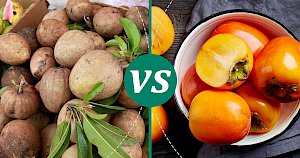Persimmon vs Sapodilla: Calories & Nutrition Showdown


Persimmon vs Sapodilla
Nutrition Facts
Serving size:
change
5g10g15g20g30g40g50g60g80g100g120g140g160g180g200g220g250g300g350g400g450g500g600g700g800g900g1000g
1oz2oz3oz4oz5oz6oz7oz8oz10oz12oz15oz20oz25oz30oz35oz40oz50oz
Amount Per Serving:
Serving size:
change
5g10g15g20g30g40g50g60g80g100g120g140g160g180g200g220g250g300g350g400g450g500g600g700g800g900g1000g
1oz2oz3oz4oz5oz6oz7oz8oz10oz12oz15oz20oz25oz30oz35oz40oz50oz
Amount Per Serving:
Persimmon vs Sapodilla 100g Compare
| per 100g | Persimmon | Sapodilla |
|---|---|---|
| Calories | 70 | 83 |
| Carbohydrates | 18.59 g | 19.9 g |
| Dietary fiber | 3.6 g | 5.3 g |
| Protein | 0.58 g | 0.44 g |
| Calcium | 8 mg | 21 mg |
| Iron | 0.15 mg | 0.8 mg |
| Magnessium | 9 mg | 12 mg |
| Potassium | 161 mg | 193 mg |
| Sodium | 1 mg | 12 mg |
| Zink | 0.11 mg | 0.1 mg |
| Vitaminium A | 81 µg | 60 µg |
| Vitaminium B1 (Thiamine) | 0.03 mg | 0.058 mg |
| Vitaminium B2 (riboflavin) | 0.02 mg | 0.02 mg |
| Vitaminium B3 (Niacin) | 0.1 mg | 0.2 mg |
| Vitaminium B6 | 0.1 mg | 0.037 mg |
| Vitaminium B9 (Folic acid) | 8 mg | 14 mg |
| Vitaminium C | 7.5 mg | 14.7 mg |
When it comes to choosing between Persimmon and Sapodilla, you might find yourself pondering not just the taste but also the nutritional benefits of these exotic fruits. Both persimmon and sapodilla are cherished around the globe for their unique flavors and health benefits. Before diving into the core comparison, let's explore some interesting facts about these fruits that might catch your fancy.
Discovering Persimmon and Sapodilla
Persimmon, often referred to as the 'Divine Fruit' due to its scientific name Diospyros, is native to China. It boasts a sweet, honey-like flavor when fully ripe. This fruit is not just a treat to the taste buds but also a visual delight, with its bright orange skin and jelly-like texture.
On the other hand, Sapodilla, known scientifically as Manilkara zapota, is a brown, kiwi-sized fruit that hails from the rainforests of Central America. Its grainy texture and sweet, malty flavor make it a favorite among people of all ages. Often eaten fresh, sapodilla is also used in desserts and smoothies to add a natural sweetness.
Comparing Nutritional Profiles
When considering Persimmon vs Sapodilla calories, sapodilla edges out with a slightly higher calorie count, offering 83 calories per 100 grams compared to persimmon's 70 calories. This makes both fruits a low-calorie option for those watching their calorie intake.
In terms of carbohydrates, sapodilla contains a marginally higher amount of carbs (19.9g) than persimmon (18.59g), making it a slightly sweeter choice. However, the difference is minimal, indicating that both fruits can be enjoyed in moderation within a balanced diet.
Fiber is where sapodilla truly shines, offering 5.3g per 100g serving, surpassing persimmon's 3.6g. This makes sapodilla an excellent choice for digestive health and regularity.
While fat content is generally low in both fruits, sapodilla contains a small amount of fat (1.1g), which is virtually absent in persimmons. This minimal fat content in sapodilla contributes to its creamy texture.
When it comes to vitamins and minerals, both fruits provide a good range of nutrients. Sapodilla has a higher content of Vitamin C (14.7mg) compared to persimmon (7.5mg), making it a better choice for immune support. Additionally, sapodilla offers more calcium and iron than persimmon, which is beneficial for bone health and energy levels, respectively.
Choosing Between Persimmon and Sapodilla
The choice between persimmon and sapodilla often comes down to personal preference in taste and texture. However, from a nutritional standpoint, both fruits offer unique benefits. Persimmon is a low-calorie, fiber-rich option with a good amount of vitamins, making it suitable for weight management and general health. Sapodilla, with its higher calorie and nutrient content, serves as a slightly more indulgent choice that supports digestive health and provides a boost of essential vitamins and minerals.
In conclusion, whether you lean towards the divine sweetness of persimmon or the malty richness of sapodilla, incorporating these fruits into your diet can add a burst of flavor and a wealth of health benefits. Remember, the best choice is the one that fits your taste and nutritional needs the most.
Persimmon 100g
70kcalCalories source
- 97% CARBS.
- 3% PROTEIN
- 0% FAT
Sapodilla 100g
83kcalCalories source
- 87% CARBS
- 2% PROTEIN
- 11% FAT
Compares of persimmon
- Persimmon vs Apple
- Persimmon vs Apricot
- Persimmon vs Avocado
- Persimmon vs Banana
- Persimmon vs Fig
- Persimmon vs Gooseberry
- see all compares of persimmon
Compares of sapodilla
- see all compares of sapodilla
Marcin Piotrowicz
calories-info.com creator
Healthy diet and healthy lifestyle promoter
Add comment